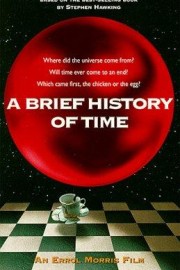A Brief History of Time
Errol Morris is something of an auteur among documentary filmmakers. Yes, somebody like Michael Moore will get more notoriety with the larger public, for good or bad, and masters like Werner Herzog, Spike Lee, and Martin Scorsese have moved between documentaries and narrative films effortlessly, but Morris is in a class by himself. I remember watching his 1997 film, “Fast, Cheap & Out of Control,” for the first time at Georgia State at the university cinema, and was blindsided by it’s peculiarity. It was a singularly unique experience, even among other documentaries I had seen in those years. It was only after watching “The Thin Blue Line,” his landmark 1988 film that didn’t just document a crime, but changed the outcome of the case, and other films of his over the years (“The Fog of War,” “Gates of Heaven,” and “Standing Operating Procedure”) that I really began to appreciate the mastery of the form, and it’s unique abilities, in the hands of a mind like Morris’s.
This is the first time I’ve watched “A Brief History of Time,” his 1991 documentary about Professor Stephen Hawking, and named after the astrophysicist’s 1988 book. I wonder what took me so long to watch it, given my fandom of Morris, and my appreciation of someone like Hawking over the past few years. Not a big science buff in school, in my 30s I’ve become fascinated by it thanks to “geek chic” shows like “The Big Bang Theory” and the prominence of people like Prof. Hawking and Neil deGrasse Tyson. The recent release of the film on Blu-Ray by The Criterion Collection helped convince me that my time for watching this film had come, and it was well worth the wait. (The recent release of “The Theory of Everything,” about Prof. Hawking’s relationship with his wife, Jane, helped goad me further, although Morris does not cover it.)
The film Morris has made does something fascinating in not just shedding light of Prof. Hawking’s life, but also giving us an accessible look at his theories, which changed our ideas of time and space and the creation of the universe. Either subject alone would be riveting to see a movie about, but by shifting between Hawking and his ideas, Morris gives us an intriguing look at a man whose own world has been contracted, as ALS disease has paralyzed his body, leaving only his mind, lungs, and heart working properly, while his outlook on the world has expanded our thinking of the universe exponentially. That duality is oddly beautiful to consider, which makes the haunting, minimalist score by Philip Glass a fitting and lovely companion to the story. Also helping immeasurably are some dramatic recreations by Morris that bring Hawking’s concepts home to even the most science illiterate of us.
Among Morris’s films, ultimately, “A Brief History of Time” doesn’t have the unique impact of “The Thin Blue Line” or “Gates of Heaven” or “The Fog of War,” but it’s indispensable viewing for anyone curious about either the subject or director. If you’re an admirer of Hawking, or just a science buff, you’ll probably have seen it already, but if not, you definitely owe it to yourself to see it to get an odd and wonderful look at the man and his life. If you’re a fan of Morris, it probably didn’t take you as long to see this as it took me to watch it, but if you haven’t seen it, you get to see what might be a turning point stylistically for one of the great filmmakers, of any genre or medium, in American cinema. It takes you on an unforgettable ride into the mind of a world treasure, and where that mind has taken humanity over the years.










